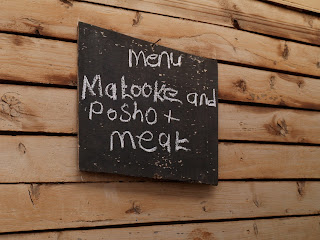So it’s not surprising that the Church of Uganda has had to address the issue of training. Last Friday I spent the morning hearing from some leaders of a pioneering new approach to this challenge: BUILD – Biblical Understanding for In-Service Leadership Development.

Here’s a picture of three of them outside the church’s guest-house at Namirembe, overlooking central Kampala: from left to right, Job Wakiwayi (Archdeacon in Mbale diocese and eastern region BUILD representative), Stephen Kewaza (Provincial BUILD Officer) and Henry Majwala (central region representative, part-time tutor at Namagongo Martyrs Seminary, and assistant vicar at Mukono cathedral).
BUILD has evolved out of Jem Hovil’s work here over the last seven years – he is now consultant to the programme and helps developing materials and training the trainers (picture of Jem taken at the Hairy Lemon).

The programme aims to gather trainees – mostly lay leaders including readers – in local centres for short spells of training. BUILD aims to have ten modules, each taking 30 hours to complete over a manageable timespan. It focuses on bible study (exegesis) and teaching skills, with an emphasis on practical application and ministry skills that are relevant and necessary for the Ugandan church and social context.
BUILD’s overall aim is to serve the Church of Uganda so that both church and nation are transformed by relevant, faithful understanding of Christian truth. Jem’s research and contribution to the thinking behind this model of training and its applicability in Uganda is documented in his inter-disciplinary 2005 Stellenbosch DTh thesis – ‘Transforming Theological Education in the Church of the Province of Uganda (Anglican)’ – which it has been fascinating for me to read.
Henry Majwala told me that the standards of preaching, discipleship and church attendance has dramatically improved in many places where leaders have been through the BUILD programme. Already, there are BUILD co-ordinators in 22 of the province’s 32 dioceses. Partnerships are being sought to resource BUILD programmes from both within and without Uganda – there’s been a real recognition that locally delivered, affordable training is the only way to improve and maintain ministry standards here, but getting the programme launched and keeping it accessible requires partnership.
The Church of Uganda has a long association with CMS – it was CMS missionaries who pioneered the evangelisation of Uganda in the late nineteenth century, and then supported the rapid indigenisation of mission and ministry here. There’s a recent description of BUILD on the CMS website, at: http://webarchive.cms-uk.org/news/2007/building-the-church-of-uganda-25052007.htm
Friday night brought another ‘first’ for the Ackroyd’s in Uganda. At around 8.45pm in the evening, as JoJo and I were engrossed in watching an episode of ‘24’ on DVD during a violent thunderstorm, we felt a noticeable earth tremor. Not very common in Uganda – though the west and east arms of the Rift Valley flank the nation. Epicentre of this one was just over the border in the DRCongo, to the west of Lake Albert. No damage or alarm in Mukono, or even moving furniture, but quite a surprise! More details: http://earthquake.usgs.gov/eqcenter/recenteqsww/Quakes/us2007dqbc.php






